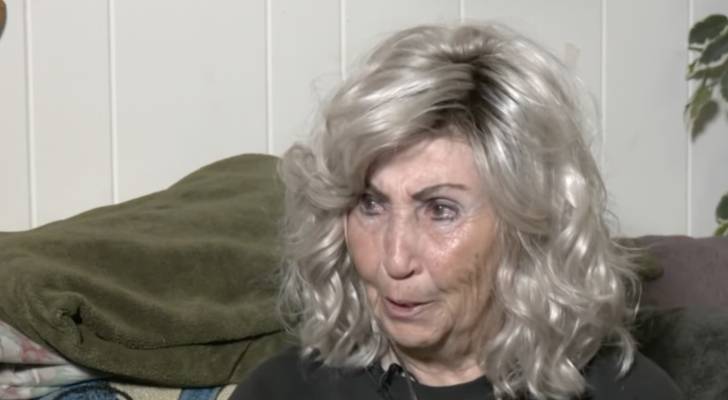
Julie Powers, a 79-year-old senior from Knoxville, Tennessee, is facing eviction from her long-time rental apartment.
The septuagenarian, who is living on a monthly fixed income of $1,900, began experiencing trouble when neighbors started filing complaints about Powers’ 42-year-old daughter, who moved into the apartment over a year ago.
Don’t miss
- I’m 49 years old and have nothing saved for retirement — what should I do? Don’t panic. Here are 5 of the easiest ways you can catch up (and fast)
- You’re probably already overpaying for this 1 ‘must-have’ expense — and thanks to Trump’s tariffs, your monthly bill could soar even higher. Here’s how 2 minutes can protect your wallet right now
- Gain potential quarterly income through this $1B private real estate fund — even if you’re not a millionaire. Here’s how to get started with as little as $10
Although her daughter had been living there for some time, tensions escalated when residents in the community raised concerns about the daughter’s behavior.
“She would scream,” Julie Powers told 6 News, “She would say words that didn’t need to be said. But what she said was loud enough for the neighbors to hear.”
Eventually, the property management company issued an eviction order for Julie Powers. If nothing changes, she’ll be required to leave her apartment within a few months.
Facing eviction after 25 years
Powers has lived at the Center Court apartment complex — managed by Freedom Investment Group (FIG) — for more than 25 years. Until recently, everything was going well. But when her adult daughter moved in after a period of homelessness, things took a turn.
“She called and said, ‘Mom, can I come over?’ I said, ‘Of course.’ So, that was in December of 2023,” Powers said.
Her daughter, who struggles with unaddressed mental health issues, exhibited behavior that unsettled other residents. As complaints mounted, the property manager issued a notice giving her 14 days to vacate the premises, citing “excessive noise” and the presence of an “unauthorized guest.” Her daughter left within the 14-day window, but returned shortly after.
In early April, Powers discovered she might be evicted from her apartment after her rent payment was declined. A week later, FIG accepted Powers’ rent payment, but the underlying issue remained unresolved.
As a result, a formal complaint was filed, and Powers was summoned to court on April 29. From FIG’s point of view, it is “responsible for providing tenants with a peaceful and tranquil living environment,” which includes “limiting excessive noise and disruptive behavior by a tenant.”
Powers appeared in court with a Legal Aid attorney. As of now, she is allowed to remain in her apartment for two more months — under strict conditions.
First, Powers’ daughter must leave the apartment by May 1 and remain on the no-trespass list. She cannot return to the property or be invited back. If she shows up, Powers is required to report it to the police.
Powers is now hoping to find a new place to live within the next month — ideally a single-family home, where her daughter’s presence won’t disturb the neighbors. In the meantime, the Knox County Eviction Program will cover Powers’ rent through June, and Water Angel Ministries is stepping in to support both her and her daughter.
“With her daughter, we will work hand in hand with her,” said Kathy Oran, program coordinator at Water Angel Ministries. “Do an assessment first of all to find out what her needs are so that she can be somewhere safe, so that she can be successful.”
Read more: Want an extra $1,300,000 when you retire? Dave Ramsey says this 7-step plan ‘works every single time’ to kill debt, get rich in America — and that ‘anyone’ can do it
How can seniors on a fixed income protect themselves?
Julie Powers isn’t alone. Many seniors living on a fixed income face similar challenges — especially during a housing crisis.
After living in what was presumably an affordable apartment for over 25 years, Powers is now being forced to look for a new home in an increasingly expensive rental market.
With average rent prices in the Knoxville area hovering around $1,800, it may be difficult for her to find an affordable place to call home with her fixed income of $1,900 per month.
Along with rising housing costs, older adults often face increased health care expenses. These mounting costs can quickly deplete retirement savings. However, financial assistance programs are available. Seniors may qualify for rental assistance, housing vouchers and emergency rental aid to help cover expenses and avoid eviction.
The HOPE Hotline (1-888-995-4673) offers free counseling and housing-related education. Representatives can also help connect older adults to local resources that offer financial and housing support.
According to the National Council on Aging, thousands of public and private programs exist to help low-income older adults pay for essentials like groceries, health care and more. Accessing these resources can help reduce pressure on fixed income.
What to read next
- Don’t have the cash to pay Uncle Sam in 2025? You may already be eligible for a ‘streamlined’ handshake with the IRS — here’s how it works and how it can potentially save you thousands
- Robert Kiyosaki warns of a ‘Greater Depression’ coming to the US — with millions of Americans going poor. But he says these 2 ‘easy-money’ assets will bring in ‘great wealth’. How to get in now
- Here are 5 ‘must have’ items that Americans (almost) always overpay for — and very quickly regret. How many are hurting you?
This article provides information only and should not be construed as advice. It is provided without warranty of any kind.